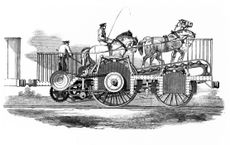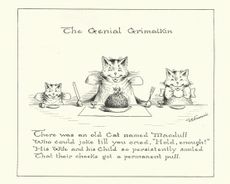
Martin Fone
After graduating in Classics from Trinity College Cambridge and a 38 year career in the financial services sector in the City of London, Martin Fone started blogging and writing on a freelance basis as he slipped into retirement. He has developed a fearless passion for investigating the quirks and oddities of life and discovering the answers to questions most of us never even think to ask. A voracious reader, a keen but distinctly amateur gardener, and a gin enthusiast, Martin lives with his wife in Surrey. He has written five books, the latest of which is More Curious Questions.
-

The BBC and the contender for the greatest April Fool's prank ever played
As April 1 looms, Martin Fone tells the tale of one of the finest stunts ever pulled off.
By Martin Fone Published
-

Curious Questions: Why do the clocks go forward in Spring?
As we move from Greenwich Mean Time to British Summer Time, some of your might be wondering: why — and if we'll always continue to change the clocks twice a year.
By Martin Fone Last updated
-

Curious Questions: Why is pancake day called 'Shrove Tuesday'?
Martin Fone investigates how Shrove Tuesday got its name — and also unveils the history of the day that precedes it, Collop Monday.
By Martin Fone Last updated
-

Nobody has ever been able to figure out just how long Britain's coastline is. Here's why.
Welcome to the Coastline Paradox, where trying to find an accurate answer is more of a hindrance than a help.
By Martin Fone Published
-

The silver screen, blockbusters and bombs: The curious terminology of films explained
What links the RAF, Jurassic Park and Jaws? More than you might think.
By Martin Fone Published
-

The real language of flowers, or how to decode your Valentine's day bouquet
On Valentine's Day, Martin Fone takes a look at the true meaning behind flowers, decoding what each individual bloom says about the receiver - or the sender.
By Martin Fone Last updated
-

From fighting for stockings to flying on the Moon: How nylon changed the world
Almost 90 years after it was first discovered, Martin Fone looks at the history of this mass produced man-made fibre.
By Martin Fone Published
-

Curious questions: how an underground pond from the last Ice Age almost stopped the Blackwall Tunnel from being built
You might think a pond is just a pond. You would be incorrect. Martin Fone tells us the fascinating story of pingo and dew ponds.
By Martin Fone Published
-

Curious questions: How a horse on a treadmill almost defeated a steam locomotive
The wonderful tale of Thomas Brandreth's Cycloped and the first steam-powered railway.
By Martin Fone Published
-

'Squopping and squidging': Who invented tiddlywinks?
Today's Curious Question takes a look at one of the nation's favourite parlour games.
By Martin Fone Published
-

Curious Questions: What is a tin tabernacle?
Martin Fone looks at the history of the tin tabernacle, and discovers a tale about the origins of corrugated iron, the history of the church in Britain and how Queen Victoria's ballroom at Balmoral got turned in to a joiner's workshop.
By Martin Fone Published
-

Curious Questions: Did the Victorians pave the way for the first ULEZ cameras in the world?
Martin Fone takes a look at the history of London's coalgates, and finds that the idea of taxing things as they enter the City of London is centuries old.
By Martin Fone Published
-

Curious Questions: What's in a (scientific) name? From Parastratiosphecomyia stratiosphecomyioides to Myxococcus llanfair pwll gwyn gyll go gery chwyrn drobwll llan tysilio gogo goch ensis, and everything in between
Scientific names are baffling to the layman, but carry all sorts of meanings to those who coin each new term. Martin Fone explains.
By Martin Fone Published
-

Curious questions: Where did Quality Street get its name from?
You sit there, devouring them all Christmas, and you didn't even think to ask, did you?
By Martin Fone Published
-

Curious Questions: How did a scrotum joke confuse paleontologists for generations?
One of the earliest depictions of a fossil prompted a joke — or perhaps a misunderstanding — which coloured the view of dinosaur fossils for years. Martin Fone tells the tale of 'scrotum humanum'.
By Martin Fone Published
-

Curious Questions: Why do we carve pumpkins at Halloween?
The devilishly smiling image of Jack O'Lantern is inseparable from Halloween, but what's the story behind it? Martin Fone explains — and discovers that the festival many complain about as an American import has been this side of the Atlantic for centuries.
By Martin Fone Published
-

Curious Questions: Margarine used to be pink — but why?
Margarine has been a staple of our breakfast tables for over a century, but it hasn't always had a smooth ride — particularly from the dairy industry, who managed to impose a most bizarre sanction on their easily-spreadable, industrially mass-produced rival. Martin Fone explains.
By Martin Fone Published
-

Curious Questions: Why was the original Euston Station destroyed in one of the greatest acts of cultural vandalism Britain has ever seen?
One of the great masterpieces of 19th century, the original Euston Station, was built in the years after Queen Victoria came to the throne. Less than 125 years later it was razed to the ground; Martin Fone takes a look at the reasons why.
By Martin Fone Published
-

Curious Questions: We used to fly cars across the English Channel in 20 minutes — why did we stop?
It seems hard to believe, but taking your car across the English Channel to France by air actually pre-dates the cross-channel car ferry. So how did it fall out of use almost 50 years ago? Martin Fone investigates.
By Martin Fone Published
-

Curious Questions: Wine has been made in Britain for over 1,000 years — so why have we only just turned it into an industry?
With the UK wine industry booming, Martin Fone takes a look at its history.
By Martin Fone Published
-

Curious Questions: Who invented the rear-view mirror?
Although obvious now, the rearview mirror wasn't really invented until the 1920s. Even then, it was mostly used for driving fast and avoiding the police.
By Martin Fone Published
-

Curious Question: Did the limerick originate in Limerick?
Before workers wasted time scrolling Twitter or Instagram, they wasted their time writing limericks.
By Martin Fone Published
-

The ship that was in two different centuries, two different years, two different months, two different days and two different seasons, all at the same time
On December 31, 1899, the SS Warrimoo may have travelled through time — but did it really happen?
By Martin Fone Published
-

The 1930s eco-warrior who inspired David Attenborough and The Queen, only to be unmasked as a hoaxer and 'pretendian' — but his message still rings true
Martin Fone tells the astonishing story of Grey Owl, who became a household name in the 1930s with his pioneering calls to action to save the environment — using a false identity to do so.
By Martin Fone Published
